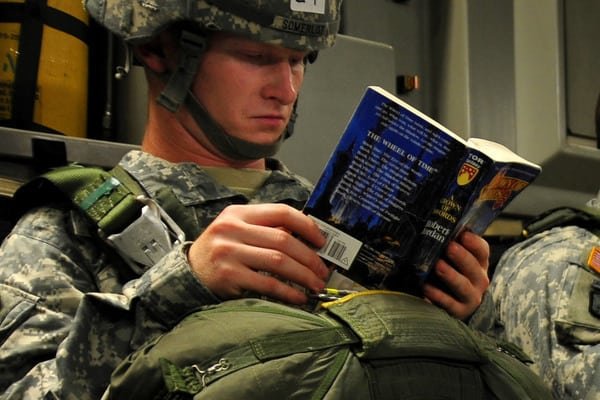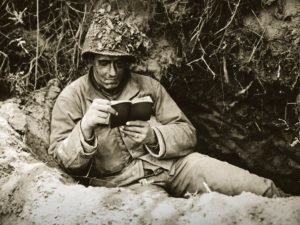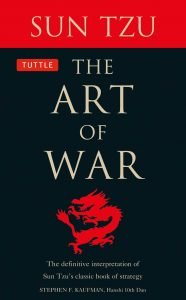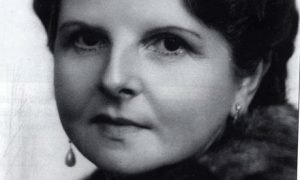
Best Books Ever Written About War That Every Man Should Read

 Every military service member needs his daily dose of knowledge and skill enhancement, inspiration and motivation.
Every military service member needs his daily dose of knowledge and skill enhancement, inspiration and motivation.
And reading some books about war nourishes his minds and clears his thoughts – superseding angst, depression, and misery with compassion, renewal, and faith in everything he does for himself and his obligations.
1. My Early Life by Winston Churchill
Considered to Churchill’s best book, this is a profound memoir which depicts colonial wars seen through the eyes of a glory-seeking shameless adventurer commonly found in such conflicts. The author does rejoice in his own contribution he gave to the campaigns, through which he gained his fame, but he also displays sympathy for all the victims he encountered through the Kitchener’s Khartoum march, the northwest India frontier, and the Boer War. A good example of this is a remarkably enlightened Dervish man wounded in the battle of Omdurman, in 1989, who is otherwise of plain social caste.
2. The Persian Expedition by Xenophon
Cyrus the Younger hires 10,000 Greeks as mercenaries, in 400 BC, to help steel the throne of Persia. The attempt is successful, but Cyrus gets killed in a battle which leaves this entire mercenary force stranded, with thousands of miles and several hostile countries between them and their home. Xenophon, the newly-elected leader of the Greek troops, rises up and leads them in an attempt to fight their way to their home. This journey is filled with incredible tactical thoughts and stories of bravery and leadership. Being a student of Socrates, Xenophon’s philosophical approach lets the reader experience these teachings in action.
3. Gates of Fire: An Epic Novel of the Battle of Thermopylae by Steven Pressfield
A book from the fiction genre may seem like it doesn’t belong here, but people with a profound taste for literature and actual soldiers all praised this work for its poignancy and accuracy. This book is often considered as the best depiction of the famous Battle of Thermopylae, where 300 Spartans fought the entire Persian Army, and died.
4. The Art of War by Sun Tzu
 This book is written in an aphoristic way and in a general tone, so one might often fight it hard to apply it and easy to misapply. However, it is undoubtedly a quintessential text about strategy and warfare. You are surely going to come out of it richer for at least some incredibly simple but highly profound lines, like “knowing yourself as well as you know the enemy”. Sun Tzu was also very descriptive when talking about leadership, which is why this is a must-read for any military soldier.
This book is written in an aphoristic way and in a general tone, so one might often fight it hard to apply it and easy to misapply. However, it is undoubtedly a quintessential text about strategy and warfare. You are surely going to come out of it richer for at least some incredibly simple but highly profound lines, like “knowing yourself as well as you know the enemy”. Sun Tzu was also very descriptive when talking about leadership, which is why this is a must-read for any military soldier.
5. The Campaigns of Alexander by Arrian
This edition rewards the reader with two documents: the first is a collection of Epictetus philosophical lectures, while the second is his own historical documentation of all the wars Alexander the Great fought. Through the second part, we see Alexander as a clear example of how toxic the burden of ambition can be. While he did manage to conquer almost all of the known world, it also led him to his death, most likely by the hands of his own subjects. There was no real purpose behind Alexander’s ploys, no tangible plans for the creation of an empire. It all just turned out to be a series of fights and victories, until he was done. And, as Epictetus observes in the end, he still gets buried just like any other man. However, that’s where one of the most important lessons given here lies. Other great lessons thought by this work touches the importance of leading from the front, speed, boldness, and the element of surprise.
6. Genghis Khan and the Making of the Modern World by Jack Weatherford
Were the Mongols actually just plain brutes and vicious animals we all think they were to this day? Or, was it all just their strategy. Indented as a means to intimidate enemies and wining fights before they start? Genghis Khan was undoubtedly one of the most cunning warriors ever, so the second outcome is much more likely. Together with the Mongolian army, he turned warfare into science. Proof of this is the fact that when Mongols would conquer a new country they would first gather up their scholars and scientists and use them for their own benefit. They also moved with great speed through the country, and were masters of maneuvers and surprise. They aimed all their strategic efforts towards launching surprise attacks and building one of the greatest empires in history, which was actually considered a place of peace, freedom, and prosperity.
7. The Book of Five Rings by Miyamoto Musashi
Miyamoto Musashi was a samurai warrior, but he was neither a soldier nor a general, technically. However, his profession did lead to a lifetime of war. Musashi dueled with all of the best warriors who lived in his time and often fought more than one at the same time. He especially teaches the difference between the perceiving eye and the seeing eye. He also emphasizes the importance of knowing your enemy better than your own commanders and actually using the knowledge to control them. The lessons offered by this book transcend the art of sword fighting. It is highly recommended to everyone!
8. Napoleon: A Life by Paul Johnson
Napoleon is definitely requiring further study on my part, as I am no expert. However, this introductory biography and books about that period in time have provided so much knowledge on the subject, primarily on the War and its Fifteen Decisive Battles of the World (more about it below). Even Emerson wrote an enlightening essay about Napoleon. Tom Reiss’ The Black Count also surprised me, which is a story about a general serving under Napoleon, who was a former slave and just so happened to be the actual father of Alexandre Dumas, the famous novelist.
9. Nella Last’s War by Nella Last, 1981
 This diary’s author is a middle-aged housewife (above), and she wrote her entire account of the things she experienced from 1939 to 1945, thus pioneering social survey Mass Observation. She was by domestic captivity for she was unhappily married. The honesty with which she writes about her reaction to the bombing, privation, dreary monotony, and fear can and do speak for all of the millions of people who were denied of any heroic role in the war. The passages containing her response to the atomic bombs dropped in 1945 are striking, to say the least. Sufficed to say she did not view it as a victory for the allies, but she regarded its significance for the entire mankind.
This diary’s author is a middle-aged housewife (above), and she wrote her entire account of the things she experienced from 1939 to 1945, thus pioneering social survey Mass Observation. She was by domestic captivity for she was unhappily married. The honesty with which she writes about her reaction to the bombing, privation, dreary monotony, and fear can and do speak for all of the millions of people who were denied of any heroic role in the war. The passages containing her response to the atomic bombs dropped in 1945 are striking, to say the least. Sufficed to say she did not view it as a victory for the allies, but she regarded its significance for the entire mankind.
More inOpen Your Mind
-
`
How Hazardous Food Packaging Chemicals Can Be Found in Humans
A startling new study has revealed that food packaging chemicals, found in materials like plastic wraps and containers, are present in...
October 4, 2024 -
`
What to Expect From Qatar Airways Business Class
Qatar Airways business class offers a luxurious experience for those seeking a comfortable and stylish flight. Travelers can expect a journey...
September 25, 2024 -
`
How to Deal with Gaslighting: 6 Effective Ways
Gaslighting is a manipulative tactic used to make a person doubt their own reality, memories, or perceptions. It can occur in...
September 21, 2024 -
`
Top 5 Things to Do in the Big Apple
New York City, often hailed as the “City That Never Sleeps,” offers an endless array of experiences. From towering skyscrapers to...
September 11, 2024 -
`
Easy-to-Follow Steps to Make Pappardelle Pasta at Home
Making pappardelle pasta at home is a rewarding culinary experience that brings the taste of Italy into your kitchen. Pappardelle, a...
September 5, 2024 -
`
How Legally Binding Is a Lease?
How legally binding is a lease? Understanding how legally binding a lease is becomes crucial for landlords when considering rental agreements....
August 31, 2024 -
`
Top 5 Must-Try Dunkin’ Donuts Breakfast Foods
When you are on the go and need a quick yet satisfying breakfast, Dunkin’ Donuts is a favorite stop for many....
August 21, 2024 -
`
What Are the Top 6 Best Places to Raise Children in the U.S?
Choosing where to settle down and raise a family is one of the most significant decisions parents can make. Finding the...
August 17, 2024 -
`
Is Wearing a Hoodie a Sign of Depression?
Is wearing a hoodie a sign of depression? This question has crossed the minds of many concerned parents and friends. It...
August 9, 2024















You must be logged in to post a comment Login